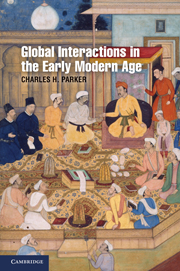Book contents
- Frontmatter
- Contents
- Maps
- Acknowledgments
- Global Interactions in the Early Modern Age, 1400–1800
- Introduction: The Global Integration of Space
- 1 European States and Overseas Empires
- 2 Asian States and Territorial Empires
- 3 International Markets and Global Exchange Networks
- 4 The Movement of Peoples and Diffusion of Cultures
- 5 The Formation of New Demographic and Ecological Structures
- 6 The Transmission of Religion and Culture
- Conclusion: Converging Destinies
- Notes
- Index
- References
1 - European States and Overseas Empires
Published online by Cambridge University Press: 05 June 2012
- Frontmatter
- Contents
- Maps
- Acknowledgments
- Global Interactions in the Early Modern Age, 1400–1800
- Introduction: The Global Integration of Space
- 1 European States and Overseas Empires
- 2 Asian States and Territorial Empires
- 3 International Markets and Global Exchange Networks
- 4 The Movement of Peoples and Diffusion of Cultures
- 5 The Formation of New Demographic and Ecological Structures
- 6 The Transmission of Religion and Culture
- Conclusion: Converging Destinies
- Notes
- Index
- References
Summary
In 1684, Philippe Couplet, a Jesuit missionary, gained an audience with the French king, Louis XIV, at his court in Versailles to ask for financial support for the Christian mission to China. To illustrate the potential of the Chinese mission, Couplet introduced Louis to Shen Fuzong, a youthful convert to Christianity preparing for the priesthood. Shen, whose baptized name was Michael Alphonse, demonstrated the use of chopsticks to the enchanted king. The gifts stoked Louis's interest in Chinese culture and his admiration for the renowned Kangxi emperor. Shortly thereafter, the French king authorized a delegation of Jesuit scientists for service in the imperial court, spawning a rich cultural exchange between France and China that has lasted into modern times.
For Europe's most powerful monarch, the Qing dynasty under the Kangxi emperor (r. 1661–1722) represented an ideal political order. The emperor wielded absolute power and enjoyed divine blessing; he employed an army of civil servants to govern his dominions; he possessed authority over a vast domain stretching from the eastern coastline to Outer Mongolia and Tibet; and he resided in a magnificent palace that exuded majestic order and power. In many respects, Louis's reign (1643–1715) also embodied these characteristics, though on a less grand scale. Casting himself in the image of Apollo (the Greek god of light and sun), Louis promoted himself as the Sun King and he professed to rule by divine right; he dominated Europe and pushed France's borders to their farthest point; and he too presided over an elaborate court life at Versailles that reflected his prestige and authority.
- Type
- Chapter
- Information
- Global Interactions in the Early Modern Age, 1400–1800 , pp. 13 - 38Publisher: Cambridge University PressPrint publication year: 2010



